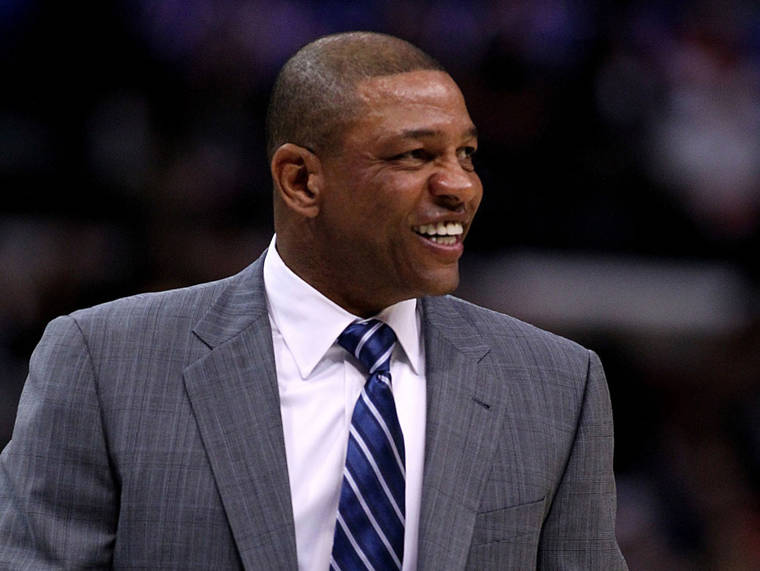Coach X said in a statement this weekend: “I am shocked and angered by the tragic deaths of George Floyd, Breonna Taylor and Ahmaud Arbery. We’re at an important moment for our country, and now is the time for us to choose kindness, tolerance, understanding, empathy … it’s time to love each other. Every life is precious …”
Coach Y said in a statement this weekend, “My father was a 30-year veteran of the Chicago police department, and if he were still with us right now, he’d be hurt and outraged by the senseless acts of racial injustice that continue to plague our country. Being black in America is tough. I’ve personally been called more racial slurs than I can count, been pulled over many times because of the color of my skin, and even had my home burned down. The response we are seeing across the nation, to the murder of George Floyd, is decades in the making. Too often, people rush to judge the response, instead of the actions that prompted it. We have allowed too many tragedies to pass in vain. This isn’t an African-American issue. This is a human issue.”
This isn’t to judge the benign response of Coach X, Nick Saban, the white Alabama coach. I’m a white columnist with white family and a white background. Saban’s underlining kum-by-yah message is one I might convey.
This is to understand how life experience and personal reflection resonates so much more in the response of Coach Y, Doc Rivers, the Los Angeles Clippers coach. It adds to why the NFL should be ashamed at having only four minority coaches and why colleges can’t be places of higher learning as long as their dismal record of diversity hiring persists.
The big issues in sports, you see, are often bigger than sports. They always have been from the time Jackie Robinson broke baseball’s color line in 1947. That remains the biggest sports story ever in America. There is no close second.
Grown, mature people in leadership roles have experiences such that their words often matter. They must be backed by action, of course. So knowing Vice President Mike Pence stormed out of an NFL game as players peacefully knelt in social protest three years ago, his words from this weekend ring hollow: “We will always stand for the right of Americans to peacefully protest and let their voices be heard.”
Doing the right thing in the moment, when it’s against your side’s beliefs, even in the smallest way, can be difficult. It’s also important. North Carolina Central coach LeVelle Moton, who is black, noted on ESPN how few of the big-name, white college coaches have commented on the recent killings.
“It seems as if black lives matter to them whenever they can benefit from it,” he said.
Last week, Miami Dolphins coach Brian Flores, who is black, was the first NFL coach or executive to comment on the murders. Flores, as I’ve written, might be the most remarkable story in NFL coaching history. He rose from the Brooklyn projects and, without the credibility of being a pro player, became an NFL head coach. That journey delivered this statement:
“I’ve had the privilege of being a part of many different circles that have included some very powerful and influential people of all different races and genders. The events of the last few weeks have brought some of the memories of those conversations back to light. I vividly remember the Colin Kaepernick conversations. ‘Don’t ever disrespect the flag’ was the phrase that I heard over and over again.
“This idea that players were kneeling in support of social justice was something some people couldn’t wrap their head around. The outrage that I saw in the media and the anger I felt in some of my own private conversations caused me to sever a few long-standing friendships.
“Most recently, I’ve had conversations about incentivizing teams for hiring minorities. Again, there was some outrage in the media and talks that this would cause division among coaches, executives and ownership. I bring these situations up because I haven’t seen the same OUTRAGE from people of influence when the conversation turns to Ahmaud Arbery, Breonna Taylor and most recently George Floyd.
“Many people who broadcast their opinions on kneeling or on the hiring of minorities don’t seem to have an opinion on the recent murders of these young black men and women. I think many of them QUIETLY say that watching George Floyd plead for help is one of the more horrible things they have seen, but it’s said among themselves where no one can hear. Broadcasting THAT opinion clearly is not important enough … “
That’s the most powerful a message a South Florida coach has ever delivered. And unlike the complex issues confronting America, the words of Flores, Rivers, Morton and selected others in recent days, offer a simple lesson for the sports world: Why black coaches matter.






